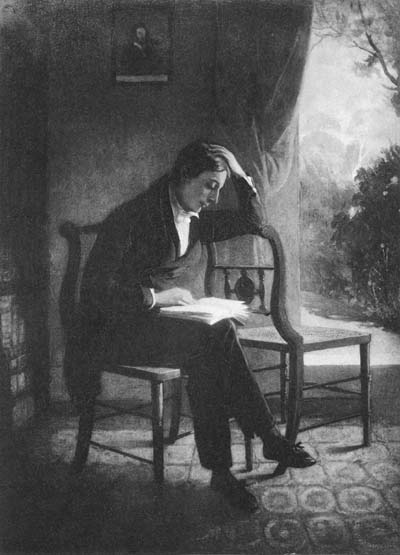
When I have fears that I may cease to be
Before my pen has glean'd my teeming brain,
Before high piled books, in charact'ry,
Hold like rich garners the full-ripen'd grain;
When I behold, upon the night's starr'd face,
Huge cloudy symbols of a high romance,
And think that I may never live to trace
Their shadows, with the magic hand of chance;
And when I feel, fair creature of an hour,
That I shall never look upon thee more,
Never have relish in the faery power
Of unreflecting love!—then on the shore
Of the wide world I stand alone, and think
Till Love and Fame to nothingness do sink.
In this poem, I think Keats is describing a few of his biggest fears. In line two, he is talking about his fear of dying before he can write all his ideas and poems. Keats wants to make his mark on the world, to leave behind something memorable like a poem; he is afraid of dying without reaching this goal. I think in lines five and six, Keats is creating a sort of illustration for romance and love by describing gazing into the starry night sky and relating it to romance. Line six, I believe, expresses many aspects of a high romance and love. By saying "High Romance" and relating it to clouds, he is referring to love and romance as a high power, and a powerful and striking thing that can be beautiful, but can also be dark and dreary. Also, “cloudy” in “huge cloudy symbols…” could refer to the unclear signs and symbols of love. When, in lines seven and eight, Keats says " And think that I may never live to trace their shadows, with the magic hand of chance", I think he is expressing his fear of not falling in love by saying that he will not to get to trace the shadows of the "huge cloudy symbols of a high romance" (line six) meaning he will not get to experience a high romance. The “hand of chance” could express how Keats thinks that love is by chance, and he won’t experience the high romance without the “magic hand of chance”, and how he fears of dying before he is lucky enough to experience love. In lines nine and ten, I think Keats could be talking about a girl, a love of his; Keats could also be literally talking about time, and how he fears of losing time, and not doing something worth his time every hour. When he says “That I should never look upon thee more”, he could be talking about never seeing a love of his again, or he could be talking about how he is a creature that is at the mercy of time, and will never get to see the past hours again. In lines eleven through fourteen, I think Keats is telling of what he fears he will become when he hasn’t appreciated the enchanting powers of love. Keats says he stands alone on the shores of the world and thinks, until he becomes nothing. I think this relates to the fears of many, to be all alone in the world, until things that you have desired become worthless. For Keats, it may be fame and love, as he says in line fourteen, and he is afraid of being so lonely that his goals and desires no longer have meaning.


No comments:
Post a Comment